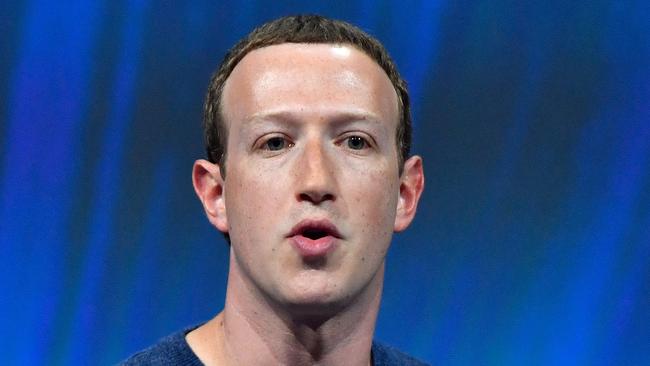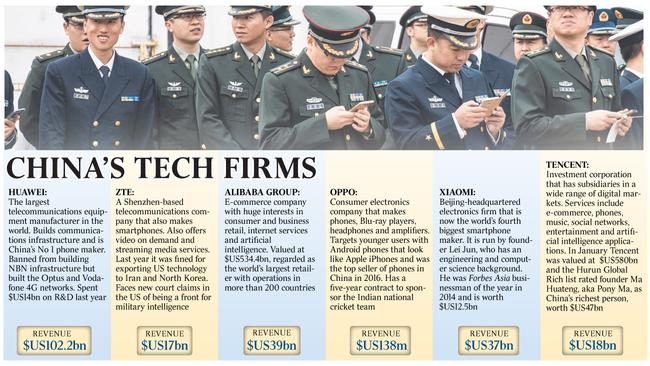MPs warn Facebook over China data deal
Mark Zuckerberg faces the threat of a public grilling before an Australian parliamentary committee.

Facebook chief executive Mark Zuckerberg faces the threat of a public grilling before the Australian parliament’s intelligence and security committee to answer questions about the technology titan’s “backdoor deal” with Huawei, the Chinese technology giant with links to the Communist Party.
The deputy chairman of the parliamentary joint committee on intelligence and security, Labor MP Anthony Byrne, said last night Facebook and its 34-year-old founder owed answers to the social network’s 15 million Australian users.
He has been backed by the Turnbull government’s chairman of the committee, Liberal MP Andrew Hastie, in a bipartisan response to revelations that Facebook had shared personal data with Huawei.
“It is completely unacceptable that information from Facebook users has been slyly handed over to Huawei, by Facebook,” Mr Byrne told The Australian last night. “I want to know why Mr Zuckerberg allowed this to happen. If need be, he will be invited to appear before the PJCIS in a public hearing to explain himself to our committee and the Australian people.” Mr Hastie said users had a right to know where their data had been stored and who had access to it.
Huawei has been banned from government contracts in Australia, including the NBN, on the advice of ASIO.
Data on Australian Facebook users — including work and education history, relationship status and likes on device users and their friends — was available to Huawei, possibly as far back as 2007.

“It’s disturbing that Facebook has shared personal data with a telecommunications company with close links to the Chinese Communist Party,” Mr Hastie said. “Why do tech companies resist giving information to law enforcement but are happy to hand it freely to foreign companies with ties to authoritarian states?”
The threats to Facebook come ahead of the release today of the committee’s report into the government’s proposed foreign espionage and interference laws, following vetting by ASIO that has warned of an unprecedented level of foreign interference and spying. “The deputy chair of the parliamentary joint committee on intelligence and security, Anthony Byrne, and I have been in conversation on this matter,” Mr Hastie said.
He said he and Mr Byrne were both “very concerned at the passing of personal information by Facebook to Huawei, and intend to consider this as a committee”.
Cyber Security Minister Angus Taylor is set to meet Facebook, Apple and Google in the US this week, ahead of new Australian laws that would force telcos and technology service providers such as Facebook to co-operate with intelligence and security agencies seeking access to encrypted data of suspected criminals, terrorists and cyber hackers.
Facebook is already expected to be among the companies called to appear before the committee in coming months to vet the encryption laws.
The technology sector has been accused of resisting calls for greater co-operation with authorities, which are becoming increasingly frustrated by the use of encrypted devices and apps by terrorists and criminals to evade detection and surveillance.
Of the Huawei revelations, Mr Taylor said last night: “This underscores how important the consumer data right is and how crucial it is that people have direct and genuine control over their own data.
“That is an objective of the Australian government through both privacy laws, data breach notifications and the consumer data right. All companies handling data must ensure the user is in control.” Huawei did not respond to a request for comment.
Facebook is facing fresh scrutiny after Mr Zuckerberg, who is worth $US74 billion, testified before both the US congress and European parliament in recent months amid uproar over the Facebook data-harvesting scandal involving Cambridge Analytica, the polling firm tied to President Donald Trump’s 2016 election campaign.
Australia’s privacy commissioner is pursuing a formal investigation into Facebook after it admitted the data of 311,129 Australians might have been improperly shared with Cambridge Analytica. Facebook has admitted that it gave privileged access to four Chinese technology firms including Huawei, which has been barred from a series of major projects in Australia because of fears the Chinese government might be spying on Australian citizens who use smartphones made by the firm. Facebook, valued at $US558bn, forged the partnership with Huawei to enable handset makers to integrate the social network’s services on to phones as part of a wider tie-up with about 60 manufacturers around the world. Three other Chinese players were part of the initiative: Lenovo Group, the world’s largest personal-computer maker; Oppo Electronics, a smartphone maker; and Chinese electronics conglomerate TCL. Facebook said it planned to wind down its data-sharing partnership with Huawei by the end of the week.
Facebook defended the decision to work with Huawei.
“Huawei is the third largest mobile manufacturer globally and its devices are used by people all around the world, including in the US and Australia,” said Francisco Varela, Facebook’s vice-president of mobile partnerships.
“Facebook’s integrations with Huawei, Lenovo, Oppo and TCL were controlled from the get go — and we approved the Facebook experiences these companies built.”
Cyber experts warned that Huawei’s activities should merit detailed scrutiny, particularly in light of new legal frameworks that mandate that the firm and other enterprises support Chinese spying as Beijing exerts great control over China’s booming tech sector.
Fergus Hanson, the Australian Strategic Policy Institute’s head of international cyber policy centre, said the Chinese Communist Party was “openly seeking a deeper relationship between the party-state apparatuses and electronics manufacturers and tech companies”. He said Facebook’s relationship with Huawei, in particular, raised “deep concerns” about personal data privacy and possible national security vulnerabilities.
“It’s almost certain that Australians have been caught up in this privacy issue both through Huawei and other companies they gave access to,” he said.





